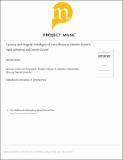Files in this item
Tyranny and tragedy : paradigms of surveillance in Theodor Storm’s Aquis submersus and Carsten Curator
Item metadata
| dc.contributor.author | White, Michael James | |
| dc.date.accessioned | 2017-03-06T10:30:09Z | |
| dc.date.available | 2017-03-06T10:30:09Z | |
| dc.date.issued | 2016-11-28 | |
| dc.identifier | 247959880 | |
| dc.identifier | d9387ed0-e2e7-4c8d-98bc-679c6b24bf40 | |
| dc.identifier | 84999806588 | |
| dc.identifier | 000389302700002 | |
| dc.identifier.citation | White , M J 2016 , ' Tyranny and tragedy : paradigms of surveillance in Theodor Storm’s Aquis submersus and Carsten Curator ' , Seminar: A Journal of Germanic Studies , vol. 52 , no. 4 , pp. 364-381 . https://doi.org/10.3138/seminar.52.4.02 | en |
| dc.identifier.issn | 0037-1939 | |
| dc.identifier.other | ORCID: /0000-0001-9128-4747/work/60427381 | |
| dc.identifier.uri | https://hdl.handle.net/10023/10403 | |
| dc.description.abstract | Theodor Storm’s Novellen Aquis submersus (1876) and Carsten Curator (1878) stand out from other nineteenth-century representations of surveillance because of their intensity. Surveillance dominates the relationships between the principal characters, provides the driving force in the narrative action, and constitutes an essential mode of metaphorical expression. Aquis submersus documents an abuse of power: surveillance, in the control of correspondence and the use of informants, is the tool of a corrupt and petty aristocracy. Here, surveillance is depicted as a perverse evil, a transgression of natural justice that stands in the way of love. The text’s ending modifies this critique, however: Katharina’s child drowns as the lovers embrace, a fact that is interpreted and recorded in a painting as paternal negligence, making surveillance a moral duty that impedes the freedom of the observer as well as the observed. Carsten Curator explores surveillance failures in different ways. Carsten’s identity derives from guardianship, and it is his son’s forays outside the paternal field of vision that lead eventually to Heinrich’s death. Yet Carsten’s morality of surveillance is exposed as ideological and emotional self-control: a picture of Carsten’s father and Heinrich’s resemblance to his mother determine Carsten’s actions, functioning as absent observers whose imaginary surveillance Carsten both fears and craves. | |
| dc.format.extent | 278599 | |
| dc.language.iso | eng | |
| dc.relation.ispartof | Seminar: A Journal of Germanic Studies | en |
| dc.subject | Theodor Storm | en |
| dc.subject | Surveillance | en |
| dc.subject | Carsten Curator | en |
| dc.subject | Aquis Submersus | en |
| dc.subject | Visuality | en |
| dc.subject | Nineteenth-century German narrative | en |
| dc.subject | Observer | en |
| dc.subject | Morality | en |
| dc.subject | PT Germanic literature | en |
| dc.subject.lcc | PT | en |
| dc.title | Tyranny and tragedy : paradigms of surveillance in Theodor Storm’s Aquis submersus and Carsten Curator | en |
| dc.type | Journal article | en |
| dc.contributor.institution | University of St Andrews. German | en |
| dc.identifier.doi | 10.3138/seminar.52.4.02 | |
| dc.description.status | Peer reviewed | en |
| dc.date.embargoedUntil | 2017-03-06 |
This item appears in the following Collection(s)
Items in the St Andrews Research Repository are protected by copyright, with all rights reserved, unless otherwise indicated.

